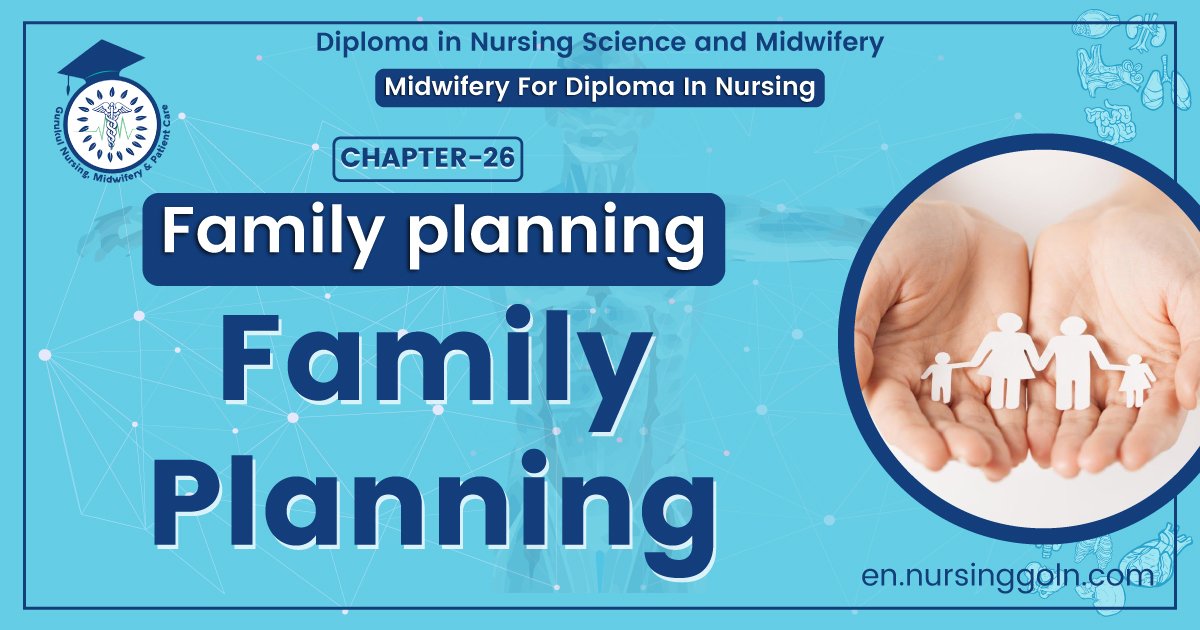Concept about Family planning – This course is designed to understand the care of pregnant women and newborn: antenatal, intra-natal and postnatal; breast feeding, family planning, newborn care and ethical issues, The aim of the course is to acquire knowledge and develop competencies regarding midwifery, complicated labour and newborn care including family planning.
Concept about Family planning
Definition of Family Planning:
An expert committee 1971 of the WHO “defined family planning as a way of thinking and living that is adopted voluntary, upon the basis of knowledge, attitudes and responsible decisions by individual and couples, in order to promote the health and welfare of the family group and thus contribute effective to the social development of a country.
or
Another expert committee of WHO defined family planning as follows: “Family Planning refers to practices that help individuals or couples to attain certain objectives:
a) To avoid unwanted birth
b) To bring about wanted births
c) To regulate the intervals between pregnancies
d) To control the time at which births occur in relation to the ages of the parent and
e) To determine the number of children in the family”.

or
Another definition according to WHO:
Family planning allows people to attain their desired number of children and determine the spacing of pregnancies. It is achieved through use of contraceptive methods and the treatment of infertility (this fact sheet focuses on contraception).
Objective of Family Planning:
1. To avoid unwanted births.
2. To bring about wanted births.
3. To regulate the intervals between pregnancies
4. To control the time at which birth occur in relation to the ages of the parent.
5. To determine the number of children in the family.
Health Aspects of Family Planning:
Family planning and health have a two way relationship. The principal health outcomes of family planning were listed and discussed by a WHO scientific group on the health aspects of family planning.
These can be summarized under the following headings:
1. Woman’s health:
- Maternal mortality
- Morbidity of woman of child bearing age.
- Nutritional status (weight changes, hemoglobin level, etc)
- Preventable complications of pregnancy and abortion.
2. Foetal health:
- Foetal mortality (early and late foetal death)
- Abnormal development
3. Infant and child health:
- Neonatal, infant and pre-school mortality
- Health of the infant at birth (birth weight)
- Vulnerability to disease.

Scope of Family Planning:
Family planning is not synonymous with birth control; it is more than mere birth control. A WHO expert committee (1970) has stated that family planning includes in its purview:-
1. The proper spacing and limitation of births
2. Advice on sterility.
3. Education for parenthood.
4. Sex education.
5. Screening for pathological conditions related to the reproductive system (eg. cervical cancer)
6. Genetic counseling
7. Premarital consultation and examination.
8. Carrying out pregnancy test.
9. Marriage counseling
10. The preparation of couples for the arrival of their 1″ child.
11. Providing services for unmarried mother.
12. Teaching home economics and nutrition
13. Providing adaptation services
Benefits/ Advantages/Importance of Family Planning:
A. Benefits for Mother
- Enables her to regain her health after delivery.
- Gives enough time and opportunity to love and provide attention to her husband and children.
- Gives more time for her family and own personal advancement.
- When suffering from an illness, gives enough time for treatment and recovery.
B. Benefits for Children
- Healthy mothers produce healthy children.
- Will get all the attention, security, love, and care they deserve.
C. Benefits for Father
- Lightens the burden and responsibility in supporting his family.
- Enables him to give his children their basic needs (food, shelter, education, and better future).
- Gives him time for his family and own personal advancement.
- When suffering from an illness, gives enough time for treatment and recovery.
D. Benefits for Nation
- The overall developmental activity of the country will gain a momentum
- Economic solvency will be achieved.
- Food, housing, unemployment problem will be eradicated.
Family Planning Programmed in Bangladesh with Its Achievement:
Organizationally the family programme in Bangladesh passed through a number of transformations five distinct and broad phases may be identified as:
1. Private and voluntary clinic based programme with little government support (1953 – 60)
2. Family planning services through government health care facilities (1960-65)
3. Large scale field based government family planning programme administered by an autonomous broad (1965-75)
4. MCH based multi-sectoral programme (1975-80)
5. Functionally integrated health and family planning programme emphasizing MCH, PHC and FP as a package.
Progress has been made in several crucial areas like:
1. Adoption of national population policy.
2. Adoption of a multi-sectoral approach within a broad based population and development framework.
3. Creation of a define administrative infrastructure from the national headquarters down to the local level.
4. Increased resource allocation for population and related activities.
5. Strong policy commitment at the highest level of the government.
6. Development of a large number of service infrastructure with about 3500 union health
and family welfare centers in the country side.
7. Recruitment, training and development of a large fleet of outreach workers.
8. A significant headway with respect to nationwide awareness about FP programme method and message of small family norm.
9. A modest but by no means nontrivial pain in the contraceptive dissemination and use.

